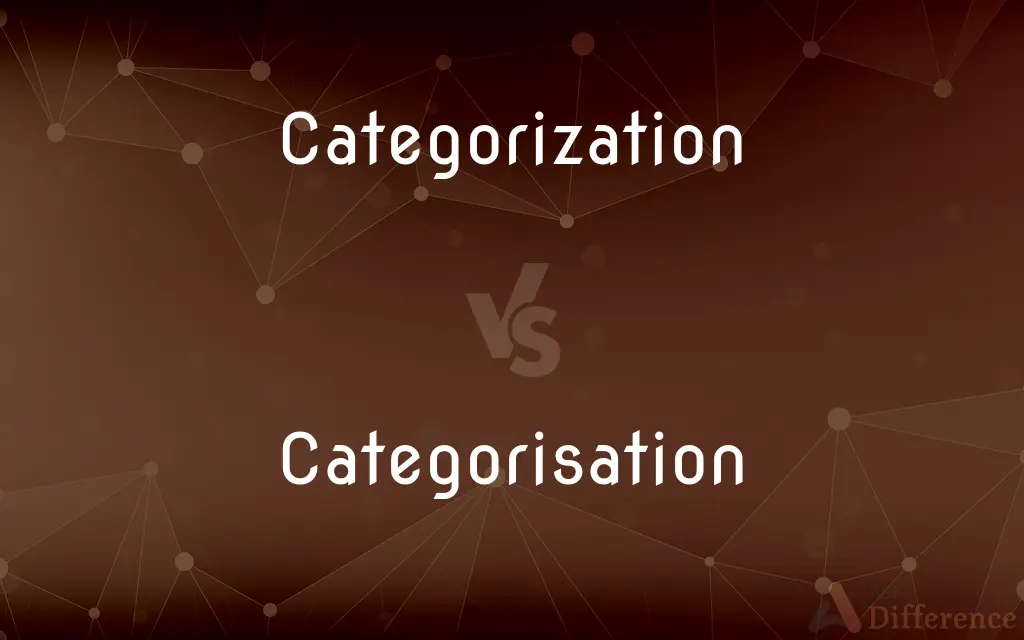Categorization vs. Categorisation — What's the Difference?
By Fiza Rafique & Urooj Arif — Updated on March 4, 2024
Categorization is the American English spelling, while categorisation is the British English version; both mean the process of sorting into categories.

Difference Between Categorization and Categorisation
Table of Contents
ADVERTISEMENT
Key Differences
Categorization and categorisation refer to the same concept—the process of sorting and organizing items into categories based on shared characteristics. The primary difference lies in the spelling, which reflects the variant of English being used. American English prefers the spelling with a "z" (categorization), whereas British English uses an "s" (categorisation). This distinction is a common pattern in English spelling variations between these two dialects, affecting not just this term but many others with the "-ize/-ise" suffix.
While both spellings are correct, the choice between them often depends on the intended audience or the standard language practices of a publication or institution. For example, an American journal would likely use "categorization," while a British publication would opt for "categorisation." On the other hand, international organizations and publications might choose one version over the other based on their editorial standards or the preference of their primary audience.
The process itself, whether referred to as categorization or categorisation, is fundamental in many disciplines, including biology, library science, and information technology. It involves recognizing patterns or similarities between items and grouping them accordingly to simplify understanding, retrieval, and communication. This process is critical for organizing knowledge, making sense of complex data, and facilitating efficient information retrieval.
Despite the spelling differences, the underlying principles and applications of categorization/categorisation remain consistent across English-speaking regions. It's a cognitive process that humans use to understand and navigate the world, as well as a systematic method employed in various scientific and scholarly fields to structure information. The importance of this process transcends linguistic variations, highlighting its universal role in organizing knowledge and aiding comprehension.
The choice of spelling does not impact the fundamental concept or its application in various fields. Whether one writes about the categorization of books in a library, the categorisation of species in biology, or the sorting of data in information technology, the focus is on the methodical arrangement of items based on shared attributes or criteria. The decision between using a "z" or an "s" simply reflects regional spelling preferences and does not alter the meaning or significance of the term.
ADVERTISEMENT
Comparison Chart
Spelling
American English
British English
Definition
Process of sorting into categories
Process of sorting into categories
Common Usage
Preferred in American publications and communication
Preferred in British publications and communication
Disciplines
Used across various fields like biology, IT, etc.
Used across various fields like biology, IT, etc.
Impact on Meaning
No difference in meaning
No difference in meaning
Compare with Definitions
Categorization
The act of sorting items into groups based on shared characteristics.
Categorization of library books makes finding them easier.
Categorisation
The process of organizing items into groups for better understanding.
The categorisation of symptoms aids in diagnosing diseases.
Categorization
Preferred in American English.
American journals often use categorization in their publications.
Categorisation
Aids in the efficient management and access of information.
Proper categorisation is key to effective research methodology.
Categorization
Applies broadly across disciplines for organizing information.
Categorization is crucial in data analysis for clarity and efficiency.
Categorisation
Demonstrates British spelling practices.
Categorisation follows the British tendency to use ise endings.
Categorization
Reflects American spelling conventions.
The spelling categorization aligns with American preferences for the ize suffix.
Categorisation
Favored in British English.
British authors typically write categorisation in their works.
Categorization
Simplifies understanding and retrieval of information.
Effective categorization helps users navigate databases quickly.
Categorisation
Essential for structuring knowledge in various areas.
In library science, categorisation facilitates efficient book sorting.
Categorization
To put into a category or categories; classify.
Categorisation
(British spelling) categorization
Categorization
A group of things arranged by category; a classification.
Categorisation
A group of people or things arranged by class or category
Categorization
The process of sorting or arranging things into categories or classes.
Categorisation
The basic cognitive process of arranging into classes or categories
Categorization
A group of people or things arranged by class or category
Categorisation
The act of distributing things into classes or categories of the same type
Categorization
The basic cognitive process of arranging into classes or categories
Categorization
The act of distributing things into classes or categories of the same type
Common Curiosities
Why does American English prefer "categorization"?
It follows American spelling conventions, which often use "ize" for words of this type.
Does the choice of spelling affect comprehension?
No, the choice of spelling does not impact the understanding of the term's meaning.
How important is consistency in spelling these terms?
Consistency is crucial within a document or publication to avoid confusion.
Can both spellings be used interchangeably?
Yes, but it's best to be consistent with the chosen English variant in a given document.
Is one spelling more correct than the other?
No, both spellings are correct within their respective English variants.
Can the spelling choice indicate the author's origin?
It can suggest whether the author is using American or British English standards.
What is categorization/categorisation?
The process of organizing items into categories based on shared features.
Is there a difference in meaning between categorization and categorisation?
No, the difference is solely in spelling, reflecting American vs. British English.
Why do British publications use "categorisation"?
It aligns with British spelling rules, which favor "ise" endings for such words.
Are there specific fields where one spelling is preferred?
The preference is based on regional language use rather than specific fields.
Why do these spelling variations exist?
They developed over time due to differences in linguistic evolution and standardization between American and British English.
Does the process differ in any way between the two spellings?
No, the process and its application remain the same regardless of spelling.
How does this spelling variation affect international communication?
It has minimal impact on communication, as the concept is universally understood.
What should non-native English speakers know about these variations?
Awareness of these differences can enhance clarity in writing and help adapt content for specific audiences.
Are there any other examples of such spelling differences?
Yes, words like "organize/organise" and "realize/realise" follow similar patterns.
Share Your Discovery

Previous Comparison
Think vs. Know
Next Comparison
Cabin vs. OfficeAuthor Spotlight
Written by
Fiza RafiqueFiza Rafique is a skilled content writer at AskDifference.com, where she meticulously refines and enhances written pieces. Drawing from her vast editorial expertise, Fiza ensures clarity, accuracy, and precision in every article. Passionate about language, she continually seeks to elevate the quality of content for readers worldwide.
Co-written by
Urooj ArifUrooj is a skilled content writer at Ask Difference, known for her exceptional ability to simplify complex topics into engaging and informative content. With a passion for research and a flair for clear, concise writing, she consistently delivers articles that resonate with our diverse audience.














































